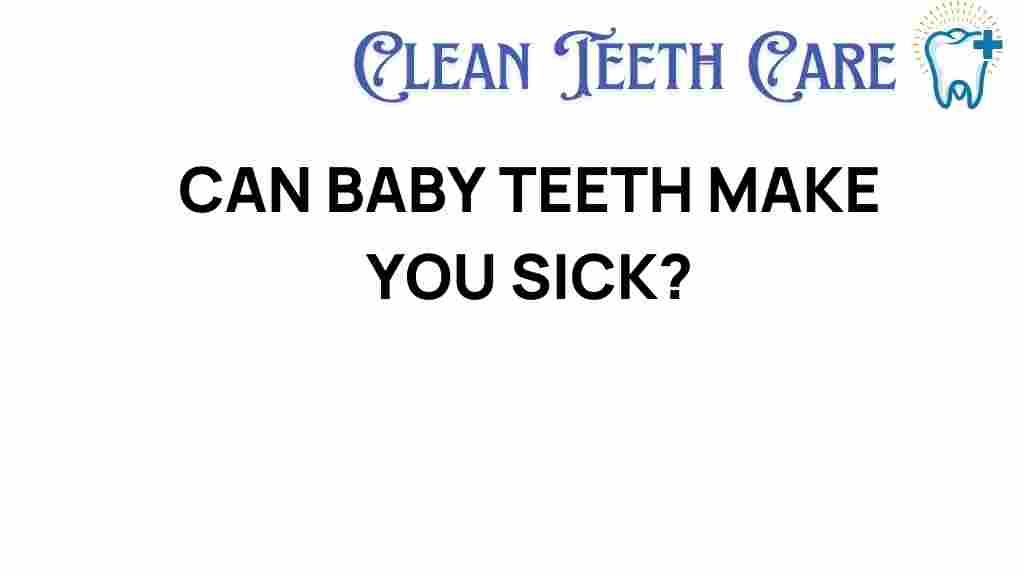Uncovering the Hidden Risks: Can Baby Teeth Make You Sick?
As parents, we often focus on the joys and milestones of our children’s growth, such as their first steps or first words. However, one critical aspect of parenting that sometimes gets overlooked is oral health, particularly the health of baby teeth. Baby teeth, also known as primary teeth, are essential not only for chewing and speaking but also for the proper development of adult teeth. Yet, many parents are unaware of the potential health risks associated with baby teeth, especially in terms of infections and disease transmission. This article will explore the hidden risks linked to baby teeth, providing valuable insights for ensuring the best oral hygiene practices for your child’s health.
The Importance of Baby Teeth in Children’s Health
Baby teeth play a crucial role in children’s overall health and development. They serve several important functions:
- Facilitating Chewing: Baby teeth help young children chew their food properly, which is vital for nutrition and digestion.
- Speech Development: Proper alignment of baby teeth aids in clear speech as children learn to articulate sounds.
- Guiding Adult Teeth: Primary teeth hold space in the jaw for adult teeth, ensuring they erupt correctly.
- Establishing Oral Hygiene Habits: Teaching children proper dental hygiene early on sets the stage for lifelong oral health.
The Hidden Risks of Baby Teeth
While baby teeth are essential for many reasons, they can also pose certain health risks if not cared for properly. Understanding these risks can help parents take proactive measures to protect their children’s health.
1. Infections from Cavities
Cavities can develop in baby teeth just as they can in adult teeth. If left untreated, these cavities can lead to infections. Signs of an infection may include:
- Pain or sensitivity in the affected tooth
- Swelling or redness in the gums
- Fever or general malaise
Infections can spread, leading to more severe health issues if not addressed promptly. Regular dental check-ups are essential to catch and treat cavities early.
2. Disease Transmission
Parents may not realize that their oral health can impact their child’s health. Bacteria that cause dental diseases can be transmitted from parent to child through practices such as:
- Sharing utensils or food
- Saliva transfer through kissing
- Using the same toothbrush
These practices can introduce harmful bacteria into a child’s mouth, potentially leading to cavities and gum diseases. It’s crucial for parents to maintain their dental hygiene to minimize risks.
3. Teething and Oral Health
Teething is a natural process that can be uncomfortable for babies. While teething itself is not a health risk, it can lead to issues if proper dental hygiene is neglected. Symptoms of teething may include:
- Excessive drooling
- Irritability or fussiness
- Swollen gums
Parents should be diligent about cleaning their baby’s gums and emerging teeth to prevent bacteria build-up during this phase.
Step-by-Step Process for Maintaining Oral Health with Baby Teeth
Taking care of your child’s baby teeth is essential for preventing infections and promoting overall health. Here’s a simple step-by-step guide to ensure proper dental hygiene:
Step 1: Begin Early Oral Hygiene
Even before your child has teeth, you can start oral care by wiping their gums with a soft, damp cloth after feedings. This practice helps remove bacteria and prepares them for future dental hygiene.
Step 2: Introduce a Toothbrush
Once your child’s first tooth erupts, usually around six months, start using a soft-bristled toothbrush. Use a smear of fluoride toothpaste (for children aged two and above, use a pea-sized amount) to brush their teeth twice daily.
Step 3: Establish a Routine
Make brushing a fun routine for your child. Use songs or games to encourage them to brush for at least two minutes. Consistency is key in establishing good habits.
Step 4: Schedule Regular Dental Check-Ups
Children should visit the dentist by their first birthday or when their first tooth appears. Regular check-ups help identify potential issues early. Find a pediatric dentist who specializes in children’s oral health.
Step 5: Educate on Healthy Eating
Teach your child about healthy eating habits. Limit sugary snacks and drinks that can contribute to cavities. Encourage a balanced diet rich in fruits, vegetables, and whole grains.
Troubleshooting Tips for Common Issues
Even with the best intentions, you may encounter some common issues with your child’s oral health. Here are some troubleshooting tips:
Issue 1: Refusal to Brush
If your child resists brushing, try the following:
- Let them choose their toothbrush and toothpaste flavors.
- Brush together; children love to mimic their parents.
- Use a timer or a fun app to make brushing exciting.
Issue 2: Teething Discomfort
To ease teething pain, consider:
- Using a clean, cold teething ring.
- Gently massaging the gums with a clean finger.
- Offering chilled fruits for older babies.
Issue 3: Signs of Infection
If you notice signs of infection, such as swelling or persistent pain, take these actions:
- Contact your pediatric dentist immediately.
- Keep the affected area clean and avoid sugary foods.
- Monitor for fever or changes in behavior.
Conclusion
In summary, while baby teeth are essential for your child’s oral health and development, they come with hidden risks that can affect overall health. Understanding the potential for infections, disease transmission, and the challenges of teething can empower parents to take proactive steps in maintaining their child’s dental hygiene. By following a consistent dental care routine and addressing any issues promptly, you can help ensure your child enjoys a healthy smile throughout their life.
For further reading on children’s oral health, check out this American Academy of Pediatric Dentistry resource. Additionally, for tips on effective parenting strategies, visit this guide.
This article is in the category Kids and created by CleanTeethCare Team
